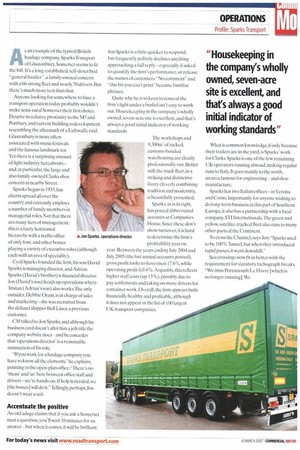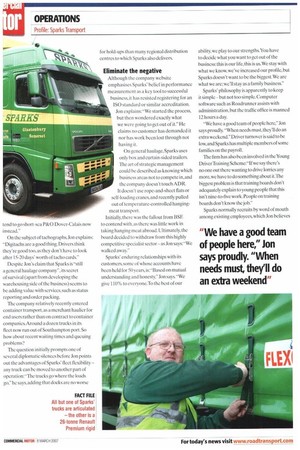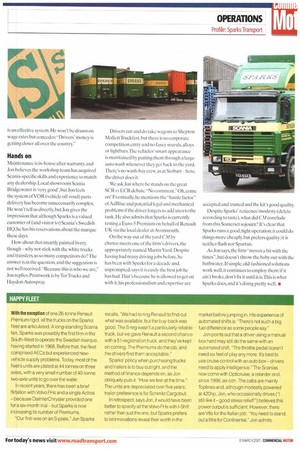THE VITAL
Page 58

Page 59

Page 60

Page 61

If you've noticed an error in this article please click here to report it so we can fix it.
As an example of the typical British haulage company. Sparks Transport of Glastonbury, Somerset seems to fit the bill. It's a long-established.self-described "general haulier", a family-owned concern with a 66-strong fleet and nearly 70 drivers. But there's much more to it than that.
Anyone looking for somewhere to base a transport operation today probably wouldn't make semi-rural Somerset their first choice. Despite its relative proximity to the M5 and Portbury, and current building redevelopment resembling the aftermath of a Luftwaffe raid, Glastonbury is more often associated with music festivals and the famous landmark tor. Yet there is a surprising amount of light industry hereabouts and. in particular, the large and also family-owned Clarks shoe concern in nearby Street.
Sparks began in 1935, has clients spread all over the country and currently employs a number of family members in managerial roles. Not that there are many tiers of management; this is a fairly horizontal hierarchy with a traffic office of only four, and other bosses playing a variety of executive roles (although each with an area of speciality).
Cyril Sparks founded the firm, his son David Sparks is managing director, and Adrian Sparks (David's brother) is financial director. Jon (David's son) heads up operations where Tristan (Adrian's son) also works.The only outsider. Debbie Oram, is in charge of sales and marketing she was recruited from the defunct shipper Bell Lines, a previous customer.
CM talked to Jon Sparks. and although his business card doesn't allot him a job title the company website does-and he concedes that 'operations director' is a reasonable summation of his role.
"If you work for a haulage company you have to know all the elements," he explains, pointing to the open-plan office. "There's no 'them' and 'us' here between office staff and drivers-we're hands-on. If help is needed,we [the bosses] will do it." Tellingly,perhaps,Jon doesn't wear a suit.
Accentuate the positive
An old adage claims that if you ask a Somerset man a question. you'll wait 10 minutes for an answer -but when it comes, it will be brilliant. Jon Sparks is a little quicker to respond, but frequently politely declines anything approaching a full reply especially if asked to quantify the firm's performance, or release the names of customers."No comment" and "this bit you can't print" became familiar phrases.
Quite why he is so keen to conceal the firm's light under a bushel isn't easy to work out. Housekeeping in the company's wholly owned, seven-acre site is excellent, and that's always a good initial indicator of working standards.
The workshops and 9,300m7 of racked, customs-bonded warehousing are clearly professionally run. Better still, the truck fleet, in a striking and distinctive livery cleverly combining tradition and modernity, is beautifully presented.
Sparks.as is its right, has posted abbreviated accounts at Companies House. Since these don't show turnover, it is hard to determine the firm's profitability year on year. Between the years ending July 2004 and July 2005 (the last annual accounts posted), gross profit looks to have risen 17.6% while operating profit fell 6%. Arguably,this reflects higher staff costs (up 13%), possibly due to pay settlements and taking on more drivers for container work. Overall, the firm appears both financially healthy and profitable, although it does not appear in the list of 100 largest UK transport companies. What is common knowledge, if only because their trailers are in the yard, is Sparks' work for Clarks. Sparks is one of the few remaining UK operators running abroad, making regular runs to Italy. It goes mainly to the north, an area famous for engineering -and shoe manufacture.
Sparks has two Italian officesin Verona and Como. Importantly for anyone wishing to do long-term business in this part of Southern Europe, it also has a partnership with a local company, STI Internationale.'The green and yellow, satellite-tracked fleet also runs to many other parts of the Continent.
To cross the Channel, says Jon: "Sparks used to be 100% Tunnel. but when they introduced rapid passes, it went downhill."
Sea crossings now fit in better with the requirement for statutory tachograph breaks. "We miss Portsmouth/Le Havre [which is no longer running]. We tend to go short-sea P&O Dover-Calais now instead."
On the subject of tachographs, Jon explains: "Digitachs are a good thing. Drivers think they're good too, as they don't have to look after 15-20 days' worth of tacho cards."
Despite Jon's claim that Sparks is "still a general haulage company", its secret of survival (apart from developing the warehousing side of the business) seems to be adding value with services, such as status reporting and order packing.
The company relatively recently entered container transport, as a merchant haulier for end users rather than on contract to container companies.Around a dozen trucks in its fleet now run out of Southampton port. So how about recent waiting times and queuing problems?
The question initially prompts one of several diplomatic silences before Jon points out the advantages of Sparks' fleet flexibility— any truck can be moved to another part of operation:-The trucks go where the loads go," he says. adding that docks are no worse for hold-ups than many regional distribution centres to which Sparks also delivers_
Eliminate the negative
Although the company website emphasises Sparks' belief in performance measurement as a key tool to successful business, it has resisted registering for an ISO standard or similar accreditation. Jon explains:"We started the process, but then wondered exactly what we were going to get out of it." He claims no customer has demanded it nor has work been lost through not having it.
On general haulage, Sparks uses only box and curtain-sided trailers The art of strategic management could be described as knowing which business areas not to compete in, and the company doesn't touch ADR. It doesn't use rope-and-sheet flats or self-loading cranes, and recently pulled out of temperature-controlled hangingmeat transport.
Initially, there was the fallout from BSE to contend with, as there was little work in taking hanging meat abroad. Ultimately, the board decided to withdraw from this highly competitive specialist sector — as Jon says: "We walked away."
Sparks' enduring relationships with its customers, some of whose accounts have been held for 50 years, is: Based on mutual understanding and honesty," Jon says. "We give 110% to everyone_To the best of our ability, we play to our strengths. You have to decide what you want to get out of the business:this is our life, this is us. We stay with what we know, we've increased our profile, but Sparks doesn't want Lobe the biggest.We are what we are; we'll stay as a family business."
Sparks' philosophy is apparently to keep it simple — but not too simple. Computer software such as Roadrunner assists with administration, but the traffic office is manned 12 hours a day.
"We have a good team of people here,"Jon says proudly. "When needs must, they'll do an extra weekend." Driver turnover is said to be low, and Sparks has multiple members of some families on the payroll.
The firm has also been involved in the Young Driver Training Scheme:"If we say there's no one out there wanting to drive lorries any more, we have to do something about it.The biggest problem is that training boards don't adequately explain to young people that this isn't nine-to-five work. People on training boards don't know the job."
Sparks normally recruits by word of mouth among existing employees, which Jon believes is an effective system. He won't be drawn on wage rates but concedes:"Drivers' money is getting closer all over the country."
Hands on
Maintenance is in-house after warranty, and Jon believes the workshop team has acquired Scania-specific skills and experience to match any dealership. Local showroom Scania Bridgewater is 'very good', but Jon feels the system of VOR (vehicle off-road) parts delivery has become unnecessarily complex. He won't tell us directly, but Jon gives the impression that although Sparks is a valued customer of (and visitor to) Scania's Swedish HQ,he has his reservations about the marque these days.
How about that smartly painted livery, thoughwhy not stick with the white trucks and transfers, as so many competitors do?The answer is in the question. and the suggestion is not well received."Because this is who we are," Jon replies. Paintwork is byTorTrucks and Haydon Autospray. Drivers can and do take wagons to Shepton Mallett Truckfest, but there is no corporate competition entry and no fancy murals, alloys or lightbars.The vehicles' smart appearance is maintained by putting them through a large auto wash whenever they get back to the yard. There's no wash-bay crew, as at Stobart here, the driver does it.
We ask Jon where he stands on the great SCR vs ECRdebate."No comment." Oh,come on! Eventually, he mentions the "hassle factor" of AdBlue and potential legal and mechanical problems if the driver forgets to add urea to the tank. He also admits that Sparks is currently testing a Euro-S Premium on behalf of Renault UK via the local dealer at Avonmouth.
On the way out of the yard CM by chance meets one of the firm's drivers, the appropriately named Martin Yard. Despite having had many drivingjobs before, he has been with Sparks for a decade and, unprompted, says it is easily the best job he has had 'That's because he is allowed to get on with it, his professionalism and expertise are accepted and trusted and the kit's good quality.
Despite Sparks' reticence/modesty (delete according to taste), what did CM conclude from this Somerset sojourn? it's clear that Sparks runs a good,tight operation; it could do things more cheaply, but prefers quality; it is neither flash nor Spartan.
As Jon says, the firm "moves a bit with the times", but doesn't throw the baby out with the bathwater.If simple, old-fashioned solutions work well, it continues to employ them: if it ain't broke, don't fix it until it is.This is what Sparks does, and it's doing pretty well. •






















































































































































































